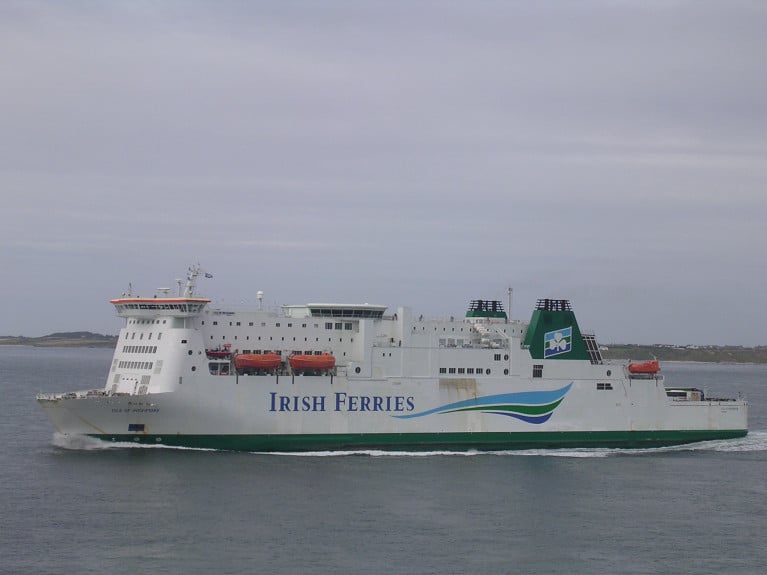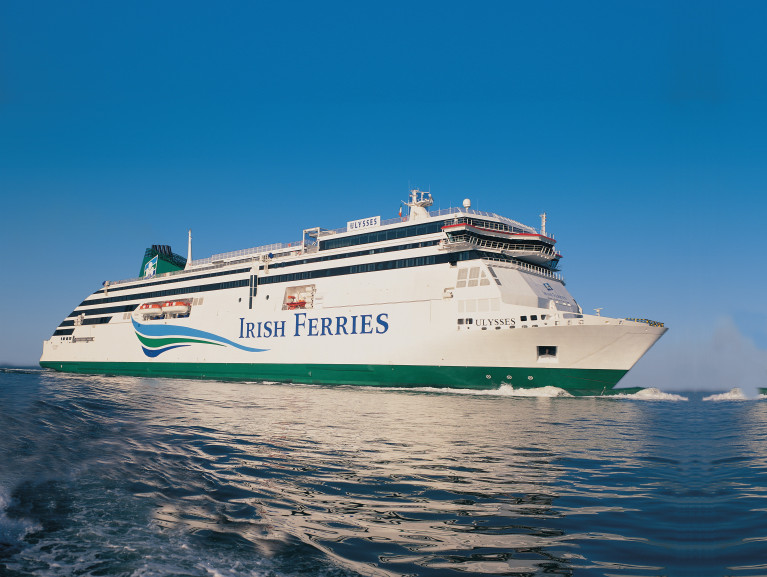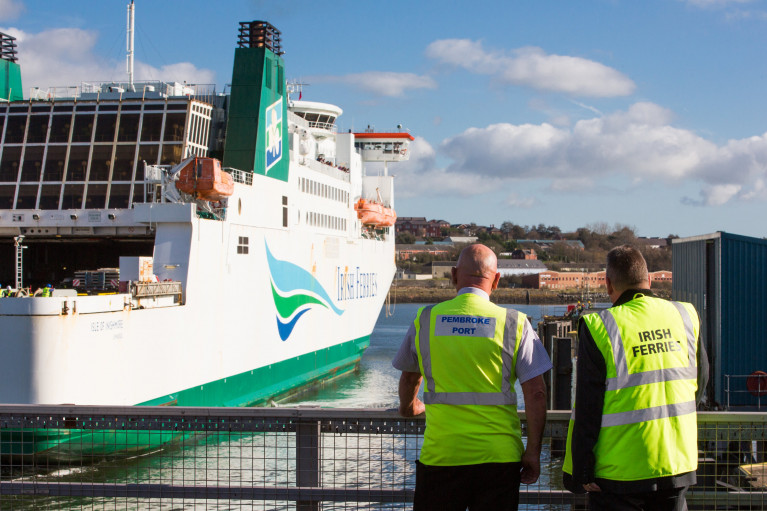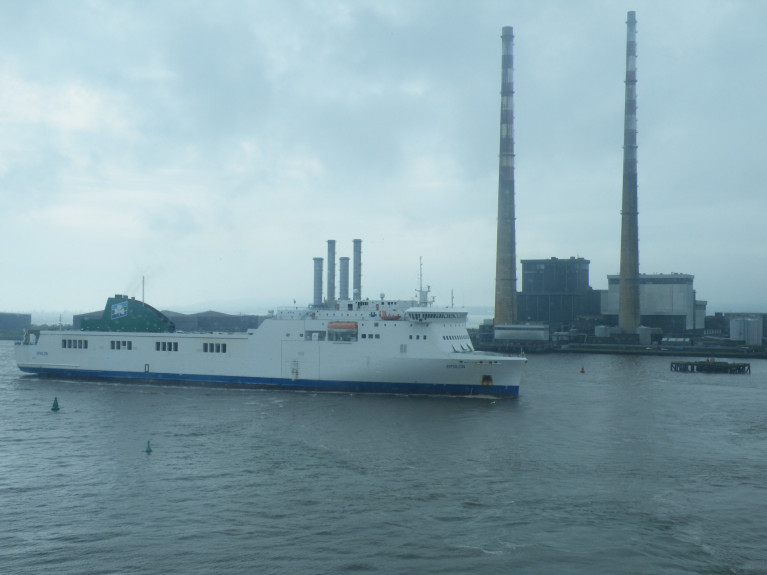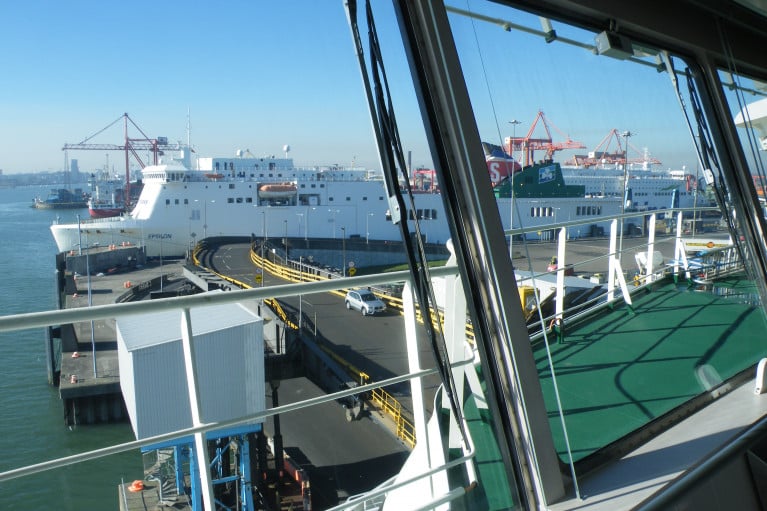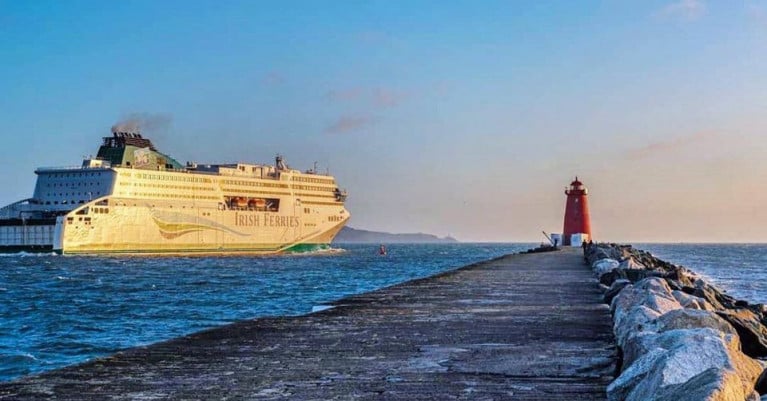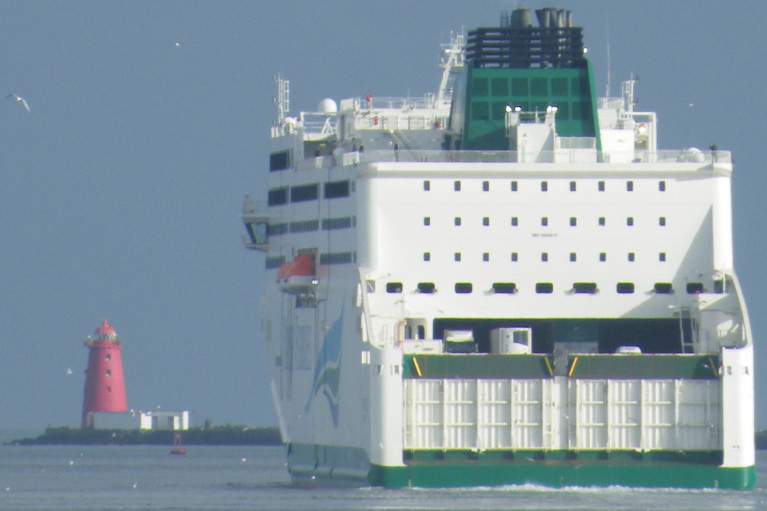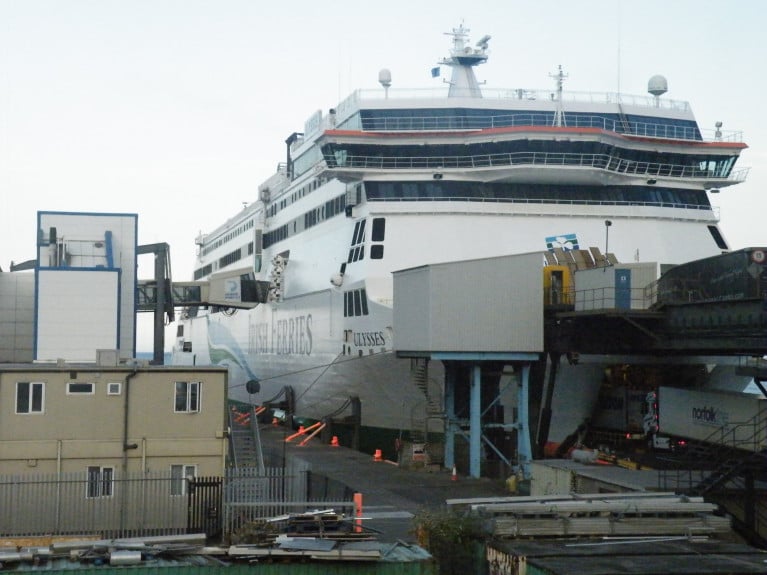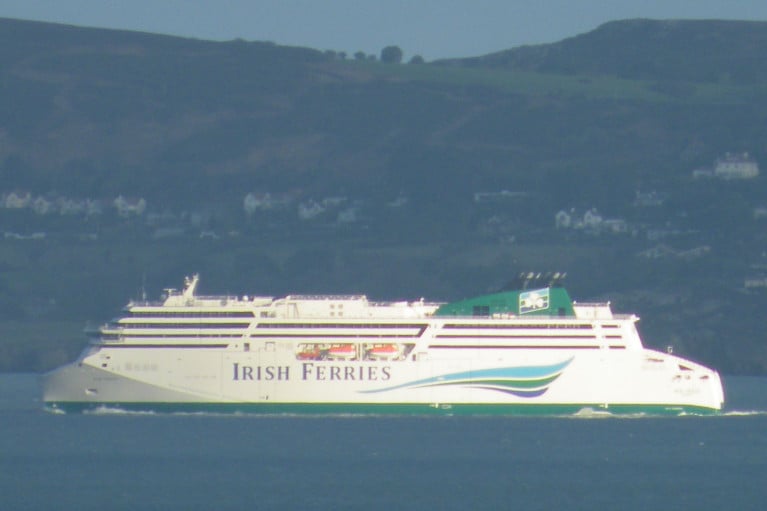Displaying items by tag: Irish Ferries
Charter of Newer & Faster Passenger RoRo for Irish Ferries Rosslare - Pembroke Route
With Irish Ferries to launch a first ever service on a UK-France route next month, the company also announced the addition of a passenger ro-ro ferry Blue Star 1 to its Rosslare to Pembroke Dock route.
The ship (to replace Isle of Inishmore) is being chartered from the Attica Group and delivery is expected in early April 2021.
Blue Star 1 was built in 2000 by the Van der Giessen de Noord shipyard in the Netherlands, the same shipyard that in 1997 built Irish Ferries Isle of Inishmore, currently servicing the Rosslare to Pembroke Dock route.
The Blue Star 1 has the capacity to carry up to 1,500 passengers, 100 freight vehicles and up to 700 cars depending on freight volume.
The ship offers a host of quality facilities including 192 cabins for freight drivers/passengers, self-service restaurant, café/bar, Club Class lounge, onboard duty-free shop, children’s play area and spacious outdoor decks. The tripling of cabin numbers will facilitate more single occupancy cabins for freight drivers, a welcome development for our freight customers.
Andrew Sheen, Irish Ferries Managing Director, said: “We are very pleased to add a quality ship of the calibre of the versatile Blue Star 1 to the Irish Ferries fleet. This ship will be the fastest RoRo Passenger ship operating between Britain and Ireland and this will help ensure schedule integrity. The introduction of this ship underlines our commitment to the Rosslare to Pembroke route, the primary shipping corridor between Ireland and South Wales. It also underlines our commitment to the significant contribution that this route makes in facilitating trade for both exporters and importers as well as facilitating essential passenger movements and future tourists as the country re-opens post COVID-19”.
A first for Irish Ferries, as the subsidiary of Irish Continental Group plc (ICG) has announced a new service on the Dover – Calais route.
The service is planned to start in June 2021, with the transfer of Isle of Inishmore (see newer ship for Rosslare-Pembroke Dock route) to the UK-France route. Additional capacity will be added in the coming months.
Irish Ferries is the market leader for freight and passengers between Britain and the Republic of Ireland, a leadership position that has been built on the twin pillars of customer focus and investment in purpose built ships for each route. An Irish Ferries spokesman said:
We are very excited about launching our services on the best short sea ferry market in the world and we believe we can bring more choice for customers in the years ahead.
As part of our commitment to the movement of freight on and off the Island of Ireland to both the UK and Europe, this additional capacity on the Dover – Calais route will significantly strengthen the capacity and reliability of the landbridge for exporters and importers.
Hauliers will now have one operator providing an inclusive service on the Dublin - Holyhead, Rosslare - Pembroke and Dover - Calais routes. This will allow exporters and importers easier, cheaper, and quicker access to our European markets via the Common Transit Convention.
It is intended to offer passenger services on the route. The initial level of passenger services offered will be dependent on the easing of Covid-19 travel restrictions.
Doug Bannister, Chief Executive, Port of Dover, said: “We are delighted to welcome Irish Ferries to Dover. This announcement gives the millions of customers across the UK and the Republic of Ireland who value the intrinsic benefits of the shortest sea crossing to Europe, the prospect of even more choice. We believe the inclusive landbridge product will be popular with Irish exporters and will strengthen the just in time supply chain into the European Union. This is a clear signal of market confidence in the Dover route and will complement the resilient services currently provided. We wish Irish Ferries every success and look forward to having them on the route in the summer and working together as part of the Dover team building the future success of the Short Straits.”
Jean-Marc Puissesseau, Chairman, Port of Calais, said: “the commencement of the service operated by Irish Ferries emphasises the strategic position of the port of Calais in the trade between Ireland, the United Kingdom and the continent. It is a clear sign of confidence just a few weeks before the opening of the new port of Calais
Irish Ferries, owned by the Irish Continental Group, has reported lower revenues and earnings for 2020 due to Covid-19 travel restrictions on its passenger business.
Irish Continental Group said its revenues for the year fell by 22.5% to €277.1m from €357.4m in 2019, while EBITDA slumped 51.5% to €42.1m from €86.8m.
Overall the group generated an operating loss of €10.4m compared to operating profits of €64.9m in 2019.
ICG Chairman John B McGuckian said that 2020 was an exceptionally challenging year for the group due to the restrictions placed on travel due to the Covid-19 pandemic.
But the chairman said that while these restrictions brought large-scale disruption and reductions in its passenger business, the other parts of the business proved resilient throughout the entire year.
More details reports RTE News here.
Ferryport of Pembroke Dock is where fears that the south Wales port could become a casualty of Brexit have proved unfounded, with Irish Ferries signing a 10-year deal with the Port of Milford Haven.
The company has signed the deal with the Port of Milford Haven for the berth at Pembroke Dock, which first came into operation under B&I Line in 1979. (Afloat adds see reference to MV Connacht's maiden sailing of Cork-Swansea before switching the Welsh port to Pembroke)
Since then, the port of Pembroke has seen multimillion pound investments to improve facilities and creating jobs and has become established as an important transport link with Europe.
In recent weeks, Westminster politicians have raised the suggestion that, as a result of Brexit, Pembrokeshire could only support a single port linking the county and the M4 corridor with the Irish Republic.
Member of the Senedd for Mid and West Wales Eluned Morgan has welcomed the decision, saying it underlines its commitment to the port of Pembroke.
More writes Western Telegraph on this development.
As Afloat reported earlier this month, general manager of Rosslare Europort said Wales should focus on just one ferry port in Pembrokeshire instead of two (Fishguard Harbour) to run alongside the main ferry port of Holyhead. The GM citing this would entice hauliers back to Welsh routes crossing the Irish Sea.
Irish Ferries Face Competitor By Boosting Freight Capacity With Second Ship on Dublin-Cherbourg Service
Irish Ferries have further responded to demands from hauliers and new competition from Stena by boosting freight capacity with a second ferry added onto the Dublin-Cherbourg service this weekend, writes Jehan Ashmore.
Afloat ascertained this development having observed the chartered ro-pax Epilson (170 freight units) depart Dublin Port on Friday afternoon with an outbound sailing to the mainland European port. It transpires based from the operator's freight website that the sailing took place earlier than scheduled due to the adverse weather conditions on the Irish Sea (see related story).
Further research revealed that Epsilon's sailing schedule on the direct Ireland-France involves a single round trip at the weekends. Whereas, during week-days the ropax resumes routine crossings on the Dublin-Holyhead service in tandem with the cruiseferry Ulysses.
Noting that the ferry sector is a constantly evolving scene given Brexit etc and so further changes in flexibilty of schedules can easily be expected. This can be due to operational reasons and market demand.
As for the present, Epsilon this morning is making its inbound sailing to Dublin Port (due 12.00) from where yesterday evening Afloat also observed the route's other ship, the cruiseferry W.B. Yeats (165 freight units) depart in the reverse direction. Also this morning, this ferry is nearing completion of the crossing to the north France port in Normandy.
The move by Irish Ferries is set against the backdrop of rivals, Stena Line which made a first entry on to the Ireland-France route this month. This new service is operated by Stena Estrid, which likewise of Irish Ferries, makes a single round trip at weekends before returning to weekday based Dublin-Holyhead sailings joining Stena Adventurer.
This is about to change as next week Stena Line is to withdraw Stena Estrid from the Ireland-Wales service and onto the Irish capital-continental route and therefore increase sailings and capacity. In addition, the smaller capacity Stena Horizon is to take 'Estrid's place by transferring to the Dublin-Holyhead route having operated Rosslare-Cherbourg service (see: newcomer Brittany Ferries) also run by ro-ro freighter Stena Foreteller.
As reported earlier this month the transfer of W.B Yeats from Dublin-Holyhead to the Ireland-France route took place more than four months in advance than scheduled. This in response to the rapid surge demanded by hauliers wanting to avoid the UK land-bridge and resultant complications of customs clearance of a post-Brexit UK.
W.B. Yeats at more than 50,000 gross tonnage is the largest ferry operating out of Ireland but due to heavy seas the ferry took a 'weather route' which involved departing Dublin Bay via the Baily Lighthouse and onward to the Kish Lighthouse and further offshore to deeper waters.
Otherwise in more favourable weather, the ferry heads south out of Dublin Bay via the Muglins Lighthouse and along off the east coast sandbanks until around off Wicklow Head. From these waters the course veers further offshore and towards the centre of the St. Georges Channel.
With Stena adding to Irish Ferries services on the Dublin-Cherbourg route, they follow the original pioneer on the direct route first launched by P&O Ferries in 2003 using the ro pax European Ambassador. On occasions subject to freight traffic demands, the ro pax would make en route calls to Rosslare Europort but on the majority of occasions this involved an arrival from France.
In the second year of service, P&O opened the route up to 'foot' passengers which was welcomed and also on a personal basis having taken the inaugural crossing on this direct and convenient connection to the continent.
Ferry Owner Irish Continental Group Sees Revenues Down 26% on Covid Hit
Ferry company owner Irish Continental Group has reported a 26% drop in revenues for the first 10 months of 2020 as the number of cars it carried on its ferries slumped by 66.8%.
In a trading update, ICG which operate Irish Ferries (services to the UK and France), said its revenues for the ten months to the end of October fell to €229m, a decrease of €79m on the same time last year.
ICG said its ferries division faced challenging trading conditions after the continuation of travel restrictions across the EU which were first introduced in the middle of March due to the Covid-19 pandemic.
It said that car volumes were down 66.8% to 122,700 from 369,700 the same time last year, with total passenger volumes down 68% compared with 2019.
ICG said this has had a material impact on passenger revenues, which were 71% lower in the year to October 31 compared to 2019.
But it added that its Irish Ferries ro-ro freight carryings have been more robust with retention of full freight schedules providing critical logistical links to the island of Ireland, with ro-ro freight carryings up 4% compared with 2019.
Further coverage from RTE News in addition a link to consult ICG's trading statement in full.
Irish Ferries parent company Irish Continental Group has reported a drop in revenues and earnings for the first six months of the year amid a challenging background of depressed economic activity and travel restrictions imposed across the EU because of the Covid-19 pandemic.
ICG said this had led to a significant reduction in passenger traffic, however freight activity across the group has been less affected.
Revenues for the six months to the end of June decreased by 21.6% to €130.8m from €166.8m the same time last year, while EBITDA sank by 66.7% to €10m from €30m.
ICG, which owns Irish Ferries, posted a loss before tax of €11.2m compared with a profit before tax of €24.9m the same time last year.
The company said the trading conditions faced by the group since March, particularly in its passenger business, have been the most challenging encountered in its 32 year history.
More here RTE News reports on this story.
Ferry and container operator Irish Continental Group (ICG) reported revenues fell more than 21 per cent in the first six months of the year as the coronavirus pandemic caused economies to shut down.
But the group, reports Irish Times, said it remained in a strong financial position to weather the Covid-19 storm.
The ferry company (Irish Ferries) said consolidated revenue for the six months to June 30th 2020 fell 21.6 per cent to €130.8 million, dragged lower by a 65 per cent decline in passenger volumes over the period. Net debt at the end of the period was €103.3 million, down from €129.0 million at the end of December 2019.
The ferries division showed a decline of more than 33 per cent, with revenue at €61.6 million for the year. Passenger cars were down 65 per cent to 56,600, compared with 161,200 a year earlier.
The container and terminal division saw a 6.6 per cent fall in revenues for the six months, as supply chains were disruption by Covid-19. Over the year to July 25th, container freight volumes were 10.5 per cent lower at 178,300 20-foot equivalent units, with units handled at the Dublin Port and Belfast Harbour (see: terminals) down 13.6 per cent year on year to 160,100 lifts.
For further reading click here.
In addition Afloat adds to consult ICG's Trading Update (here) that was released today.
Passengers coming from Britain to the Republic and subjected to a two-week quarantine, at a time when Boris Johnson’s government has exempted Irish citizens from its own restrictions, puts the entire Common Travel Area at risk post-Brexit, according to the head of ferry operator Irish Continental Group (ICG).
ICG, owner of Irish Ferries, has seen passenger numbers slump 60 per cent so far this year amid Covid-19 travel restrictions, it said in a trading statement on Thursday.
As The Irish Times writes, the company has written to the Government arguing that a requirement that people travelling to the State should self-isolate for 14 days is not consistent in the Common Travel Area (CTA) with the UK government’s position that no such measures be taken by passengers travelling from the Republic to Britain.
“There is nothing to stop people from Britain visiting Ireland by transiting via Northern Ireland without the requirement to self-isolate, which is clearly anomalous,” ICG said.
Speaking to The Irish Times, ICG chief executive Eamonn Rothwell said: “The CTA is going to be very important to Ireland post-Brexit. We don’t want to risk the British people turning around and saying, ‘Hold on a sec, we’re letting Irish people travel to Britain but you’re forcing British people to go via Northern Ireland.’ There’s a risk that they’ll retaliate.”
The Government’s quarantine rules for travellers came into effect on May 28th and are due initially to last until June 18th.
For more click here noting the reference to ICG's decision to cancel an order for a new Dublin-Holyhead ferry with a shipbuilder, after the German shipyard company filed for protection from its creditors in April.
Ferry operator, Irish Continental Group (ICG) has said its division, Irish Ferries experience passenger numbers slump by 60 per cent so far this year due to Covid-19 travel restrictions.
The company, according to The Irish Times, also said in a trading statement that it has cancelled an order with shipmaker Flensburger Schiffbau-Gesellschaft (FSG) to build a new vessel, after the German company filed for protection from its creditors in April.
ICG, led by chief executive Eamonn Rothwell, said that it has written to the Government arguing that a requirement that people travelling to the State should self-isolate for 14 days is not consistent in the Common Travel Area with the UK government’s position that no such measures be taken by passengers travelling from the Republic to Britain.
“There is nothing to stop people from Britain visiting Ireland by transiting via Northern Ireland without the requirement to self-isolate, which is clearly anomalous,” ICG said.
While ICG said that its freight business has remained relatively robust during the coronavirus pandemic, it is currently unable to estimate the full-year financial impact of the fall-off in passenger revenue. “The severity of this reduction in passenger revenue is dependent on the duration and nature of travel restrictions, particularly over the peak summer season,” it said.
Roll-on, roll-off freight volumes have fallen 4 per cent in the year to June 6th, while container volumes have dropped 13 per cent.
For more notably the cancellation to order a second newbuild cruiseferry click here.
Afloat adds the €165.2m newbuild for the Dublin-Holyhead route was based from the same design of W.B. Yeats of 54,975 gross tonnage (165 lorries) but larger at 67,300grt (330 lorries). This would enable the world's largest ferry with this level of freight capacity operate on the core Irish Sea route exclusively.
Due to Covid-19, the W.B Yeats which Afloat reported yesterday had only resumed service on the Dublin-Cherbourg route in its role as the summer-operated cruiseferry. On Tuesday the cruiseferry began on the first round trip which was completed with an arrival to Dublin Port this morning.
Prior to the return of W.B Yeats on the year-round operated route (by ropax Epsilon) to mainland Europe, W.B. Yeats as scheduled served the Dublin-Holyhead route with sailings over the winter months. Originally the cruiseferry was expected to re-enter the French route three months ago.



























